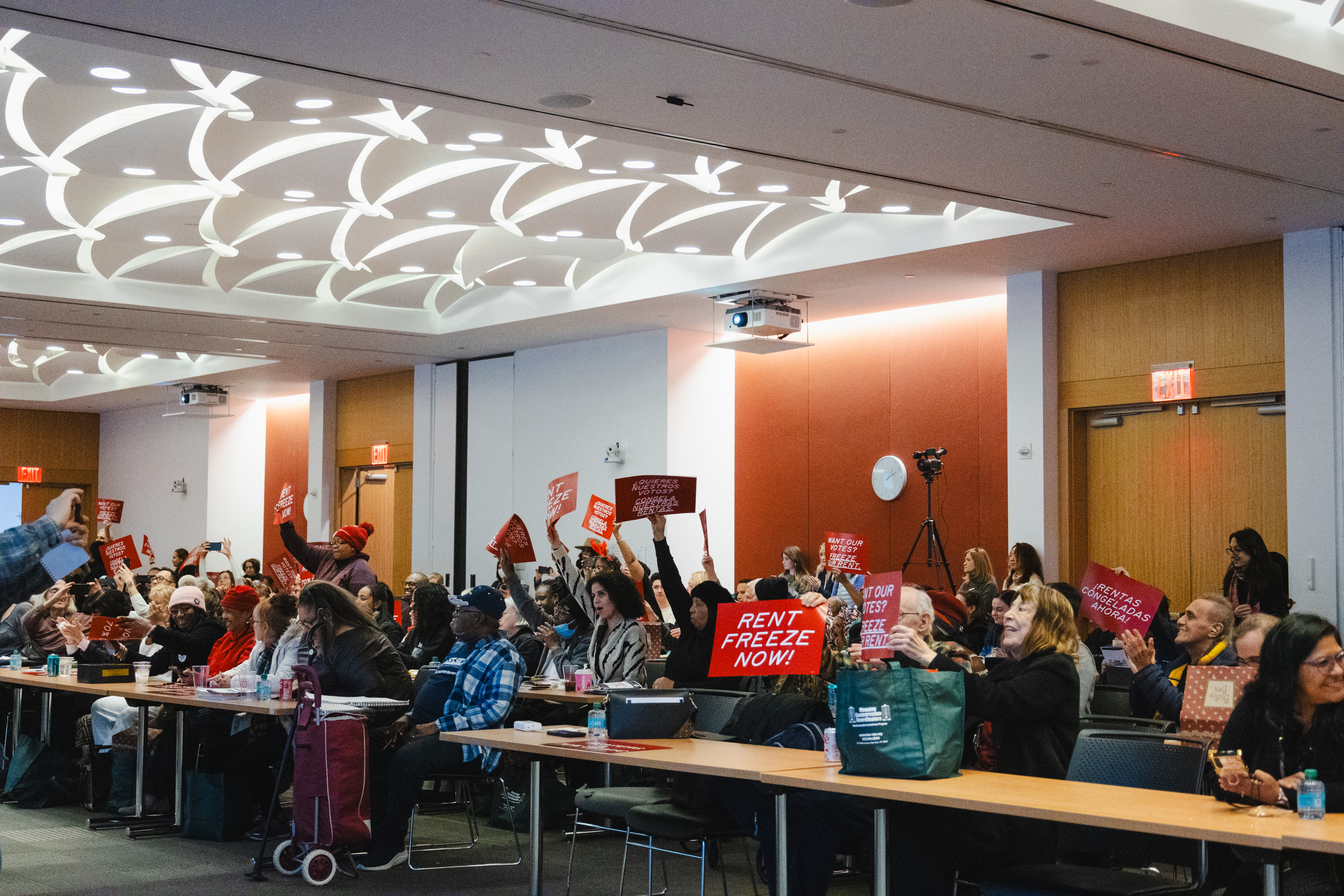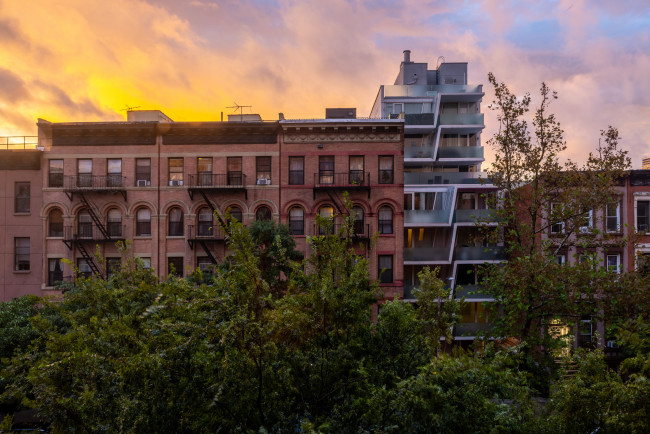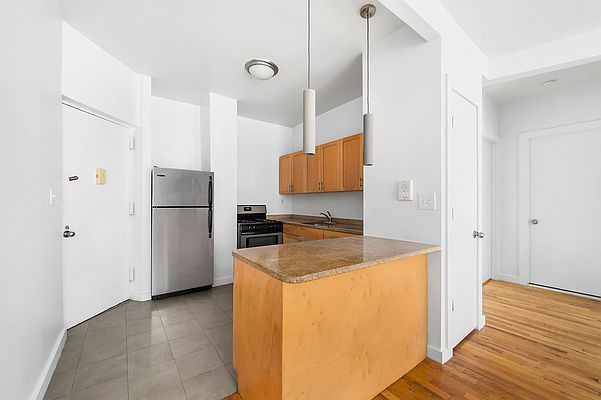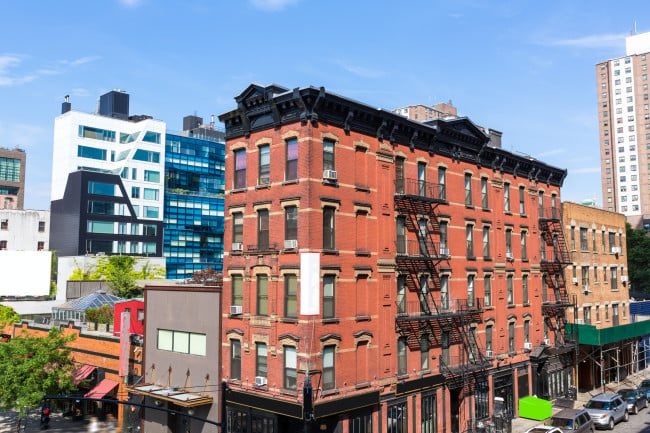NYC mayoral hopefuls want a rent freeze, but tenants may have to wait until 2026
- At least three mayoral candidates committed to freezing rents for rent stabilized tenants
- The mayor appoints members to the Rent Guidelines Board, which sets rent increases for stabilized units
- A hypothetical rent freeze wouldn’t take effect until October 2026, after a Rent Guidelines Board vote

Seven NYC mayoral hopefuls gathered at a forum on housing at Fordham University School of Law on Saturday, Dec. 7th.
Photo courtesy: Alex Chan
At least three candidates for New York City mayor have backed freezing the rent at the city’s roughly one million rent stabilized apartments. But to do so, a mayor would need to shake up the city board that caps rent increases, making it unlikely that rent-stabilized tenants would see their rent frozen before October 2026.
Rent increases at Gotham’s rent stabilized apartments are capped by the Rent Guidelines Board, a nine-member board of mayoral appointees that voted to raise rents earlier this year. The mayor has the power to appoint members to that board—impacting its decision—but a new mayor wouldn’t be able to appoint anyone until they take charge in January 2026.
“We’re still a ways out in terms of any immediate relief,” said Tim Collins, a partner at Collins Dobkin & Miller who served as the executive director of the Rent Guidelines Board from 1987 to 1994.
Whoever wins the mayoral race will be sworn in on Jan. 1st, 2026, and could appoint new RGB members to push through a rent freeze for leases and renewals commenced between Oct. 1st, 2026 and Sept. 30th, 2027, Collins added. But he noted that the board considers a lot of factors when making the decision of whether, or how much, to raise rents.
Of the roughly 30 registered candidates for NYC mayor, two hopefuls—state Senator Jessica Ramos and former Bronx Assembly member Michael Blake—said they would freeze rents at rent-stabilized apartments during a housing forum on Saturday.
Their commitments follow Assembly member Zohran Mamdani, who became the first candidate to support a rent freeze with an announcement in October.
Read on for a breakdown of how a NYC mayor could institute a rent freeze, and who is promising one.

How a rent freeze would actually work
The RGB sets a cap on rent increases for the city’s rent-stabilized apartments each summer. Last June, they approved increases of up to 2.75 percent on one-year leases and up to 5.25 percent on two-year leases, allowing landlords to raise rents for leases commenced on or after Oct. 1st, 2024 through Sept. 30th 2024.
The board determines the rent increase cap based on research about the city’s housing supply, the cost of building operations, public testimony, and other data, and it has to explain its decision to the public. But its members are picked by the mayor, giving the mayor “considerable influence” over rent-stabilized rents in the city, Collins said.
“They're not in a position to unilaterally implement a rent freeze, but they certainly could weigh in on the process, " Collins said.
To institute a rent freeze, the mayor would simply appoint members of the board that would vote for one, said Leah Goodridge, a tenant attorney and commissioner on the Planning Commission, and a former member of the RGB under then-Mayor Bill de Blasio.
“Yes the board votes separately and has its own vote, but in essence there is huge mayoral control,” Goodridge said. “You appoint people who are going to do a rent freeze.”
A member can be removed at any point after their term expires, and the chair serves at the discretion of the Mayor, according to the RGB. Of the nine-member board, two individuals represent property owners, another two represent tenants, and the remaining five members (including the chair) represent the general public.
Those five public members—the swing votes—have the most power to impact a RGB decision, Goodridge said. To freeze rents, the mayor would realistically need three public members in support of a rent freeze to add the two tenant members’ votes, she added. (Of the public members, one seat is currently vacant, per the RGB.)
After a mayor takes office in January 2026, the first RGB vote on rent increase caps would take place over the summer. Any rent increases or freeze would go into effect for “leases being renewed and vacancies occurring on or after” Oct. 1st of 2026 through Sept. 30th of 2027, according to the board.
What would a rent freeze mean?
While not immediate, a potential rent freeze could bring relief to tenants struggling to keep up with the cost of living, said Cea Weaver, coalition director for Housing Justice for All.
“Being able to tackle the cost of living crisis means tackling the cost of rent,” Weaver said. “It would give a lot of us a huge sense of relief at a moment when inflation is completely out of control.”
One Brooklyn tenant, who rents a rent-stabilized, two-bedroom apartment for $2,591.42 per month, said she’d welcome a rent freeze. The renter (who requested anonymity) said that she doesn’t worry about an immediate rent increase, but in the long term is concerned that she won’t be able to afford her apartment.
“You think that if you find a rent-stabilized apartment it means you will be there forever, but there is still a financial reality that you might still get priced out, especially if my salary weren’t to increase proportionally, or, God forbid, I lose a job and have to take a pay cut,” the renter said. “If I knew there was going to be a rent freeze, it would really make me feel like I could stay here forever.”
To that point, landlord advocates have said past rent increases approved by the RGB have failed to keep up with inflation and the cost of operating a building, leading to poorer housing stock for residents. And any decision by the board should take those costs into account, said Kenny Burgos, CEO of the New York Apartment Association, in a statement to Brick Underground.
"The Rent Guidelines Board is mandated by law to evaluate the economic health of buildings and adjust rents to cover operating costs,” Burgos said. “They are an independent body and not simply pawns for a mayor. Any mayoral candidate pledging to destroy that independence is either pandering for votes, or they are admitting they do not intend for the RGB to follow the law."
What candidates would freeze the rent?
Ramos, Blake, and Mamdani have all committed to a rent freeze for rent-stabilized tenants. Here's where the other mayoral candidates stand on a rent freeze.
NYC Comptroller Brad Lander said he was "committed to reforming the RGB, and to keeping any rent increases as low as possible, while also ensuring that tenants can count on their heat being provided, supers paid, and buildings well maintained," in a statement to Brick Underground.
New York State Senator Zellnor Myrie committed to appointing “members of the rent guidelines board that will be putting our renters first,” at the Saturday forum at Fordham University. Attorney Jim Walden said he supports freezing the rents for tenants who live in buildings owned by landlords who will not disclose their operating costs and income, Gothamist reported.
Lastly, former Comptroller Scott Stringer said he will ensure that rent-stabilized tenants pay a rent that’s “commensurate with income and with stability for our neighborhoods,” Gothamist reported. Mayor Eric Adams did not attend the forum, and has previously supported the RGB’s decision to increase rents this year, per Gothamist.
You Might Also Like































